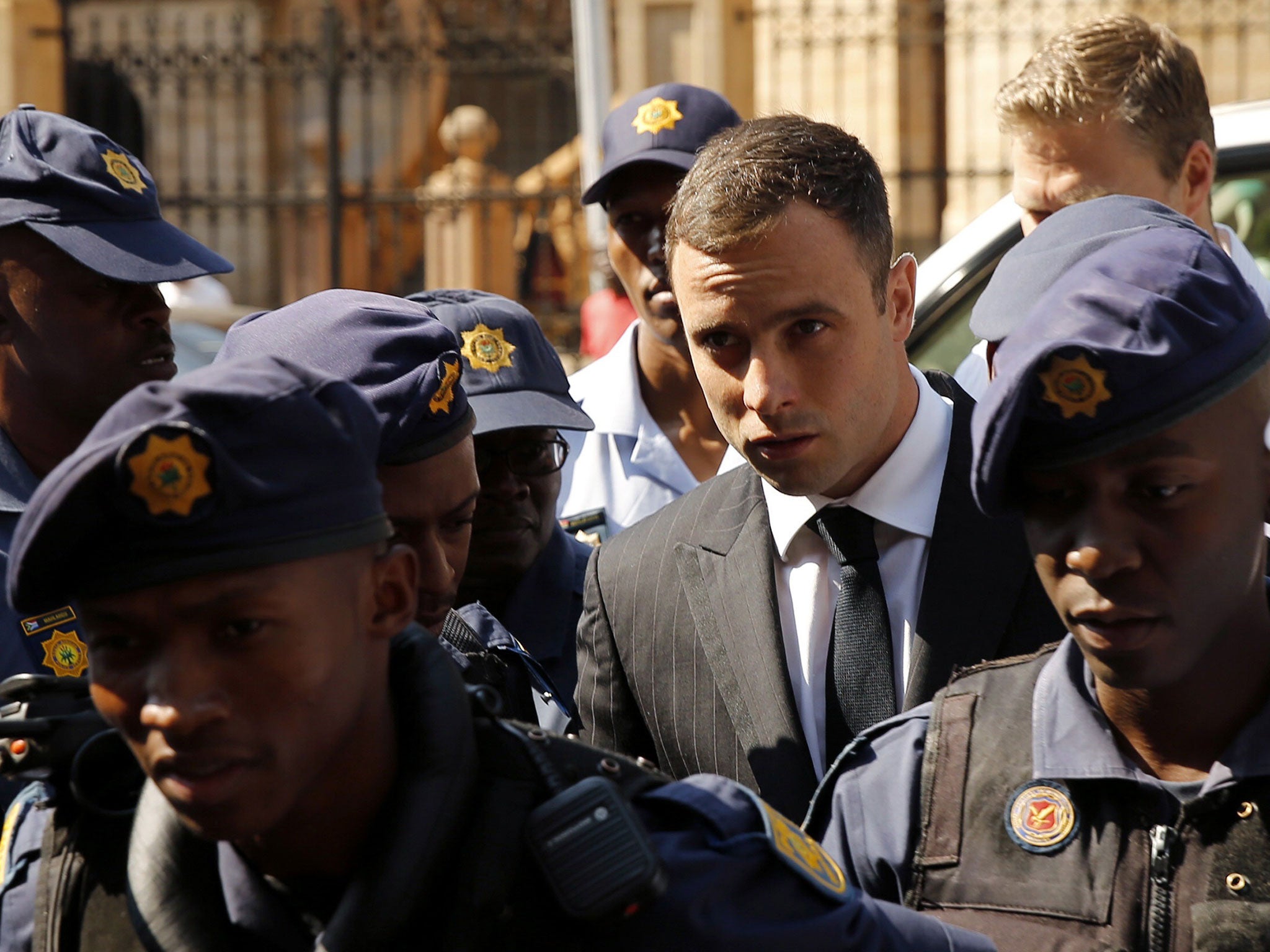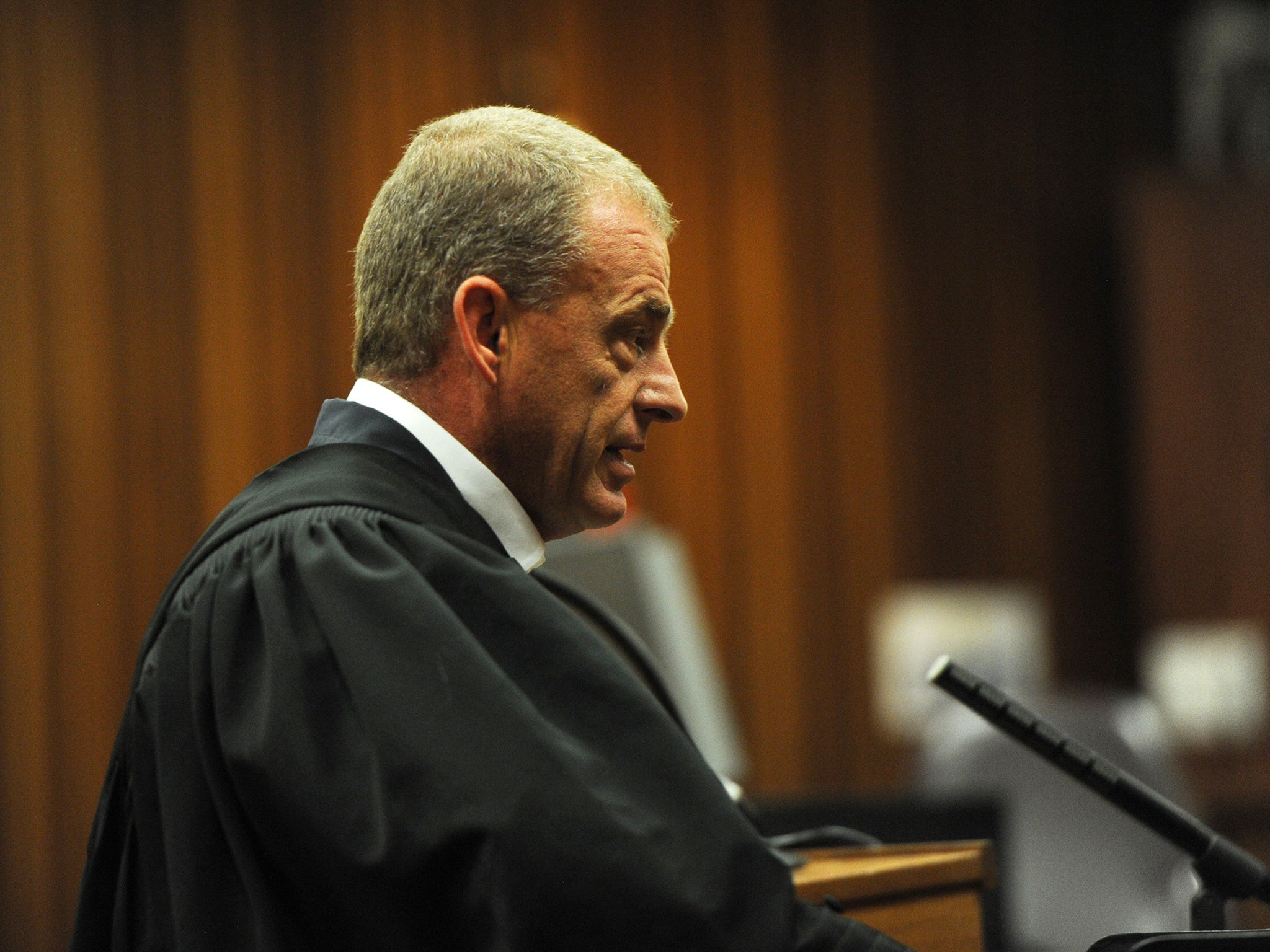Oscar Pistorius sentencing: Paralympian 'should serve three years of house arrest and community service', court hears
Pistorius was convicted last month of culpable homicide for the shooting of his girlfriend Reeva Steenkamp

Your support helps us to tell the story
From reproductive rights to climate change to Big Tech, The Independent is on the ground when the story is developing. Whether it's investigating the financials of Elon Musk's pro-Trump PAC or producing our latest documentary, 'The A Word', which shines a light on the American women fighting for reproductive rights, we know how important it is to parse out the facts from the messaging.
At such a critical moment in US history, we need reporters on the ground. Your donation allows us to keep sending journalists to speak to both sides of the story.
The Independent is trusted by Americans across the entire political spectrum. And unlike many other quality news outlets, we choose not to lock Americans out of our reporting and analysis with paywalls. We believe quality journalism should be available to everyone, paid for by those who can afford it.
Your support makes all the difference.Oscar Pistorius should serve three years of partial house arrest and carry out community service rather than be jailed for the killing of his girlfriend Reeva Steenkamp, the athlete's sentencing hearing has been told.
Correctional services social worker Joel Maringa argued against a prison term as he appeared for the defence during the first day of the sentencing hearing.
The South African athlete was acquitted of pre-meditated murder and second-degree murder last month, but convicted of culpable homicide for the shooting of his girlfriend Ms Steenkamp.
During the hearing today, Mr Maringa said Pistorius was a "co-operative" person. He said he should be sentenced to three years of "correctional supervision", which would mean the athlete would have to spend a portion of the day at home.
He also said he should carry out community service, such as cleaning work at a museum in Pretoria.
State prosecutor Gerrie Nel, who is pushing for a lengthy prison sentence, described the social worker's recommendations as "shockingly inappropriate" and described it as "no sentence."
Maringa, a social worker in South Africa's correctional services, listed Pistorius' involvement in international sporting bodies as well as charity projects and predicted that the athlete's behavior could be "successfully modified within the community context."
Earlier in the hearing, psychologist Dr Lore Hartzenberg, told the court Pistorius was "a broken man, who has lost everything."
She said Pistorius had lost "his love relationship with Miss Steenkamp" as well as his "moral and professional reputation", friends and "his career".
She said: "On an emotional level, his self-perception, his self-worth and identity have been damaged to the extent that he's unlikely to fully recover from the consequences of the shooting incident that occurred on the 14th of February, 2013."
Mr Nel criticised her findings, saying Pistorius would likely have the chance to rebuild his life.
Earlier in the hearing, Dr Hartzenberg, who described herself as an expert in trauma counselling, said she first met Pistorius on February 25 last year, 11 days after the death of Ms Steenkamp, and had been counselling him since then.
"Some of the sessions were just him weeping and crying and me holding him," Dr Hartzenberg said, describing Pistorius as overcome with grief and guilt that he had caused Ms Steenkamp's death.
She said the shooting and Pistorius' lengthy and high-profile murder trial meant the athlete had also suffered severe loss.
"I can confirm his remorse and pain to be genuine," she said.

Responding to Dr Hartzenberg's description of a broken man, Mr Nel asked the psychologist about Ms Steenkamp's family.
"Would you not expect a broken family?" he asked, saying her father Barry had suffered a stroke as a result of the killing of his daughter.
Mr Nel said Pistorius also had the opportunity to return to his life and his track career. "We are now dealing with a broken man, but he is still alive," the prosecutor said.
Judge Thokozile Masipa adjourned the hearing early as Mr Nel requested time to review documents before he calls at least two of the state's witnesses on Tuesday. Sentencing is expected to conclude by the end of the week.
Sentences for culpable homicide - negligent killing - can range from a suspended sentence and a fine to 15 years in prison.
Pistorius has admitted killing law graduate-turned-model Ms Steenkamp on Valentine's Day last year when he fired four shots through his toilet door. But he said it was a tragic accident and a case of mistaken identity - thinking the person in his bathroom was an intruder, and not his long-term girlfriend.
Additional reporting by Press Association, Associated Press and Reuters